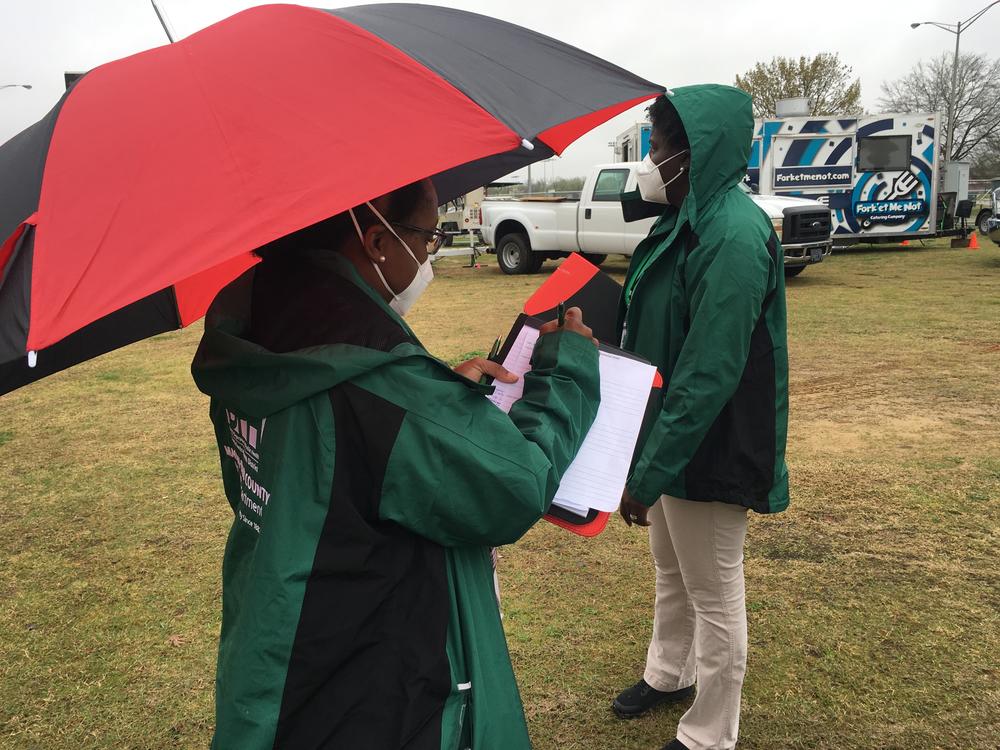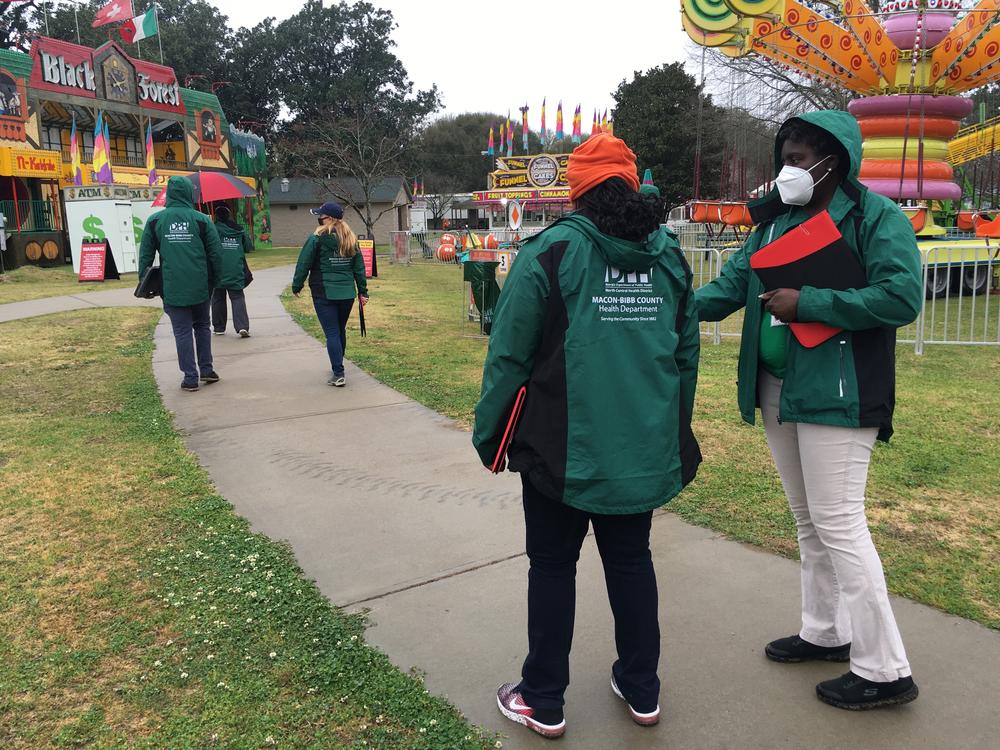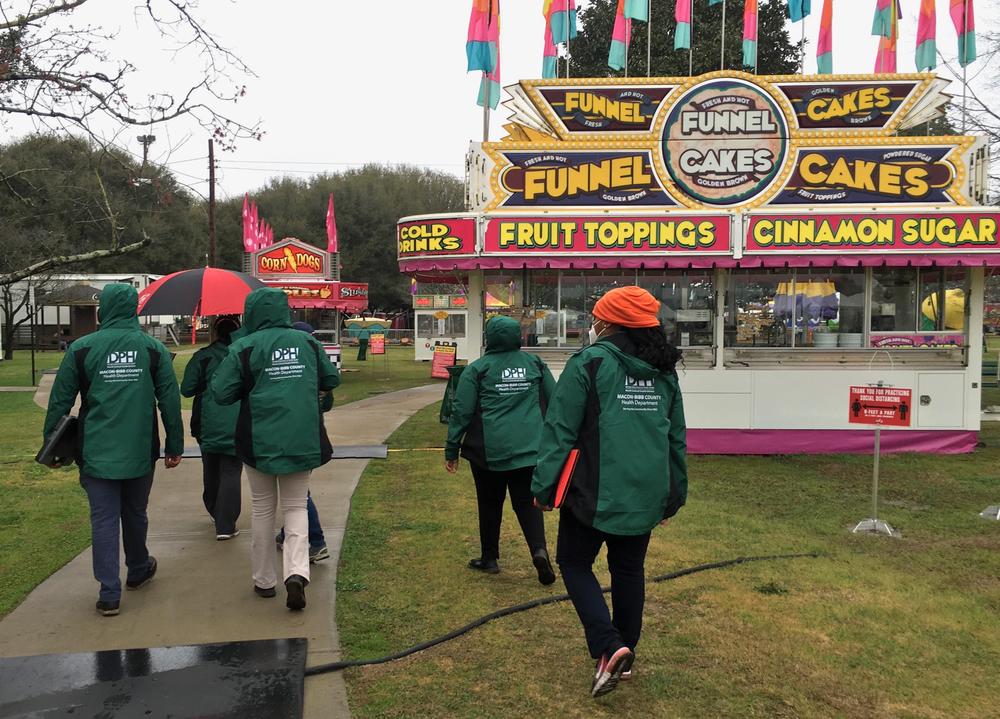
Caption
A change in Georgia law removes food safety enforcement from the Department of Public Health for nonprofit-led events such as Macon’s Cherry Blossom Festival.
Credit: Liz Fabian/CCJ

A change in Georgia law removes food safety enforcement from the Department of Public Health for nonprofit-led events such as Macon’s Cherry Blossom Festival.
A small army of health inspectors fanned out across this week’s burgeoning fairground at Carolyn Crayton Park.
Wearing green and black Department of Public Health jackets in Wednesday morning’s light rain, they were armed with clipboards and a wealth of knowledge on food safety.
For the first time during the near 40-year-run of the Cherry Blossom Festival, education is all they can offer. Last August, the Georgia General Assembly stripped local health departments of oversight and the authority to issue permits for most nonprofit events.
“We are no longer in the nonprofit temporary food business,” North Central Health District environmental health director Carla Coley told the Macon-Bibb County Board of Health last fall.
“I am outraged,” Board of Health member Chris Tsavatewa said at the time. “I can’t believe that I was unaware that this legislation was being debated, much less passed. But that is what happens in COVID times.”
Food safety is one of the tenets of public health, Tsavatewa said.
“It is an egregious lapse of judgment by the legislators, in my opinion, that they are gutting some of the pillars of environmental health,” he said.
For nonprofit or government entities sponsoring events operating less than 120 hours, the city or county now has the option of issuing a permit at no charge.
Macon-Bibb County did not to issue permits for Cherry Blossom Festival food vendors, but has asked the health department to do informational inspections at the park.
County Manager Keith Moffett said the county doesn’t have the manpower or the expertise to inspect vendors and issue permits.

Macon-Bibb County environmental health inspectors visited Carolyn Crayton Park as food vendors were setting up Wednesday for the Cherry Blossom Festival.
Under the law, when health department investigators notice anything amiss, they cannot do anything except report it to the county, or in this case, the festival since it contracted with food vendors.
Cherry Blossom CEO Stacy Moore said they took this week’s information from the inspectors, shared the concerns with vendors and made sure they comply.
“They can’t cite them but we can. So, the citation or the warning would not come from them it would come from us,” Moore said Friday before opening ceremonies.
Under the new law, the county can request the health department do inspections but cannot grant them enforcement abilities.
The legislation also removes the provision in the original law that allowed an organization to appeal an action or final order that adversely affects them. Up until last summer, appeals could be taken to the state’s commissioner of public health.
The law was enacted after a Marietta ministry group had to get a permit to provide free peanut butter and jelly sandwiches to school children over the summer, said the health board’s legal counsel Julia Magda.
“The county health department had the power to cite people and take it to Municipal Court. By taking that away it was clear they didn’t want the health department involved,” Magda told the board Monday.
Tsavatewa believes there are unintended consequences of the legislation, which was aimed at smaller operations.
“It requires 159 counties to figure out how they’re going to respond,” he said. “What has happened is this has directly affected the large operations, the ones we’re most concerned about for communicable issues.”
Macon-Bibb County Commissioner Elaine Lucas, who serves on the board of health, raised the issue with commissioners and former Mayor Robert Reichert last fall. In the transition to the Miller administration, no formal Memorandum of Understanding, or MOU, was developed with the health inspectors.
Lucas is worried there are not enough safeguards in place under the new law.
“With Cherry Blossom, I’m scared to death and I frankly would not patronize any of the food service,” Lucas said at Monday’s board meeting. “We’re just going to cross our fingers and do some serious praying that we don’t have a situation come up because we’re still responsible. The county could be responsible for it and I don’t know how much immunity you would have for this kind of thing.”
Macon-Bibb Health Administrator Dr. Jimmie Smith defended the county’s handling of the new directive and believes they are following the law.
Although there is no MOU, Smith has been working behind the scenes with the county to ensure food safety.
“We will keep good notes and share that with Cherry Blossom leads and back with the county manager,” Smith reassured board. “If anything rises to a level it needs more technical assistance, the team will be on it.”

Health department inspectors conducted site visits at the Cherry Blossom Festival this week, but under revisions to Georgia law are powerless to issue citations for violations.
Moffett said he does not feel a formal MOU is needed, but Tsavatewa, who was recently elected chairman of the board of health, wants stakeholders to get together and evaluate the new policy.
The board of health’s legal counsel, Julia Magda agrees.
“We don’t want a food thing blowing up in our face during the Cherry Blossom Festival,” Magda said Friday.
Tsavatewa also wants to discuss fees for the inspectors’ services.
The law does not allow a county to charge nonprofit organizations for a food permit, but the health inspectors can be compensated for their time as long as the health department does not make a profit off the fee.
This year’s inspections were done as a courtesy and public service.
“I applaud our staff for going above and beyond. Particularly not letting this situation go under the radar in our first time out the gate,” Tsavatewa said.
The festival is the first true test of the new health safety enforcement procedure for nonprofits, but Moore said the public has nothing to worry about.
“Well, I ate here last night so I’m not real concerned,” she said. “We’re doing the exact same process. It’s just a different ending as to who is holding them accountable."